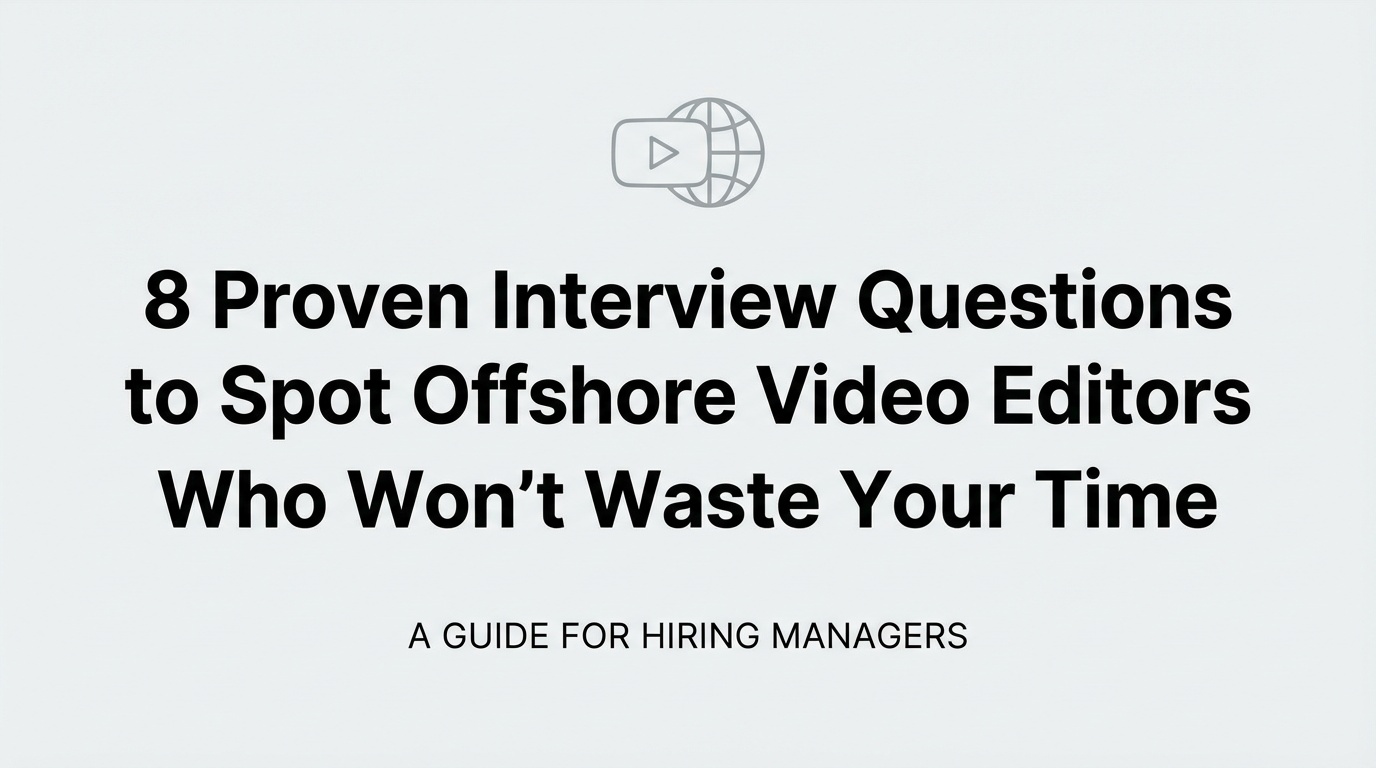By
Omar Eldeeb
July 16, 2025
•
4 Min Read

When we interview offshore video editors at Remote Growth Partners, we’re not just trying to check boxes. We’re trying to figure out one thing:
Can this person actually make great edits at our pace, to our standards, with our feedback, and do it again tomorrow?
If you’ve ever hired editors before, you know how tricky it can be. Portfolios only show the best 2% of someone’s work. Test projects help, but you can’t run 40 paid tests for every role. And the biggest problems, communication, consistency, culture fit, don’t show up until weeks into the job.
That’s why we built an interview system that screens for more than just technical skill. It’s designed to surface editors who are clear communicators, creative under pressure, and great collaborators, not just people who know how to trim a timeline.
Here’s how we run our interviews. This is the exact structure we use after reviewing thousands of candidates for our clients.
Surfaces ROI focus, storytelling chops, and decision‑making under real stakes.
It yanks the convo straight to ROI, i.e. views, watch‑time, sales.
A‑players explain how they ingest, develop the story, polish it, and review the data. They name the trade‑offs they made, the metrics that moved, and why.
They credit process and teammates, not luck.
Watch their eyes: dabblers stall on “uh… transitions.” Pros light up and hand you the playbook. One killer question, 80 % of your signal.
It spotlights editors who study style guides, audience personas, and competitor reels to nail tone and color palette from frame one.
Pros show a repeatable research workflow, ie. brand audits, mood boards, reference cuts, that lock in consistency and makes approvals faster.
This video‑editor interview question filters for strategic thinkers who protect brand equity, slash revision rounds, and spin creative decisions into measurable brand‑consistency KPIs. One sharp answer, and you know they’re brand‑safe, not brand‑risk.
This is one of our favorite soft-skill questions. Because let’s be honest: clients are rarely clear. And great editors know how to interpret vague feedback and ask the right follow-ups to get clarity fast.
A strong answer here might include:
What we’re listening for is emotional maturity and clarity under pressure.
A surprisingly useful creative test. We often give editors rough Zoom interviews, talking head clips, or unpolished vlogs and want to see how they add life to it.
A good candidate might talk about:
We’ve even had candidates say they study YouTube retention graphs to reverse-engineer pacing.
This gives us a peek into their process and reliability, especially if they’ll be working across time zones.
First, we're looking for them to talk about how they communicate prioritization of their projects. Are they checking in each day about what the priority should be and giving estimated timelines for turnarounds? If so, this is a great sign
We also want to hear about file structure, naming conventions, version control, and daily workflow habits. If someone mentions Notion, Frame.io, Trello, or ClickUp that’s a plus. But even a shared Google Sheet with timelines and checkboxes shows pro-level thinking.
This one’s not about right answers, it’s about self-awareness and resilience.
Some editors say they step away and come back later. Others say they’ll watch similar edits for inspiration. Some ask for feedback early, instead of forcing it on their own.
The worst answers? “That never happens” or “I just edit anyway.” We all get stuck sometimes, and we want people who’ve built tools for getting unstuck.
Everyone has a limit. Some editors hate long-form webinars. Others dislike overly corporate explainers. We respect that.
We just want people to be honest and self-aware because burned-out editors don’t produce great work. And we’d rather place someone in the right fit than force it.
This is our way of previewing their workflow, and seeing how they prioritize.
Do they say “I’d skim the footage and look for emotional beats”?
Or “I’d clean up the audio and color first”?
Or “I’d write a rough headline and build a structure”?
There’s no wrong answer, but we want to hear that they think in terms of storytelling, hierarchy, and clarity.
Let them ask you things too, but these prompts help guide useful discussions:
These help you assess passion, alignment, and motivation, and give the interview a human close.
Recruiting, testing, and interviewing the most talented SDRs, designers, video editors, and marketers from overseas.